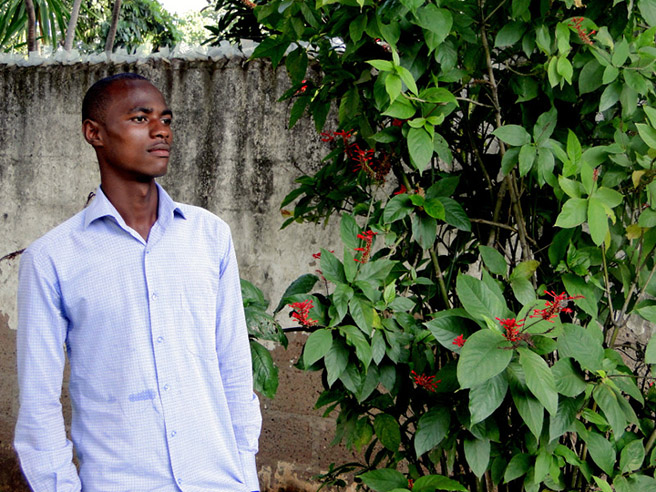Graduating with Honors

Thanks to the AWF Conservation Schools program, more students in rural Africa will have access to a quality primary school education. But what happens once they graduate? Secondary schools can be located far from local villages and tuition can be out of reach for many poor, rural families.
In Zambia’s Sekute Chiefdom, AWF’s Kazungula team established an education trust fund to enable a select group of deserving students to continue on to secondary school. Administered by the Sekute Community Development Trust, the multi-year scholarships support students throughout their secondary education. Scholarships are contingent on a commitment by students and their guardians to protect the Chiefdom’s natural resources.
In the past four years, AWF has sponsored more than 500 students from Sekute to attend secondary school. One of these recipients was Clement Masangu, an 18-year-old from Kazungula, Zambia.
No money for tuition
Since grade 1, math had been Clement’s favorite subject in school. As he got older, he enjoyed studying “calculating subjects”—anything to do with solving formulas and math problems. By grade 9, Clement knew he wanted to go into electrical engineering.
But there was a time when finishing secondary school could well have been out of question for this young man.
Clement’s father passed away in 2008, leaving his uncle and his mother to support Clement and his four younger siblings. “When my dad passed away, we didn’t have money to pay high tuition fees,” he explained. It was actually his uncle who steered him toward AWF’s Easements for Education program and encouraged him to apply.
After attending grades 8 and 9 at one school, Clement received Easements for Education support that allowed him to transfer to Hillcrest Secondary Technical School, a prestigious boarding school for the final two years.
I didn’t realize I could go there because the tuition was so high,” said Clement. “Easements for Education allowed me to attend…the best school in Livingstone.”
Same opportunities
Clement recently graduated from Hillcrest with impressively high marks and will be attending the University of Zambia in Lusaka next year to pursue a degree in electrical engineerinbg. He hopes to one day be able to support his two brothers, two sisters and other disadvantaged children from the Chiefdom.
“I want them to go to school and have the same opportunities that I did,” said Clement. He expressed a similar wish in a moving thank you letter he wrote to AWF in February: “I would like to humbly urge you to continue sponsoring students in Sekute Community, as this will help wipe out illiteracy in the community, Zambia, and later, Africa.” He included a photocopy of his grade 12 report card with the letter, noting, “It is because of the help you rendered that I am a proud holder of this kind of result.”
Meanwhile, Clement continues to be an inspiring role model to his younger siblings who are now motivated to study hard. His uncle is also thrilled that his nephew is moving on to tertiary school.
And Clement, for his part, now sees a clear link between education and conservation. “Through education, you see benefits that conservation offers from tourism and employment,” he explained. “Conservation will benefit future generations and help people through better education opportunities.”